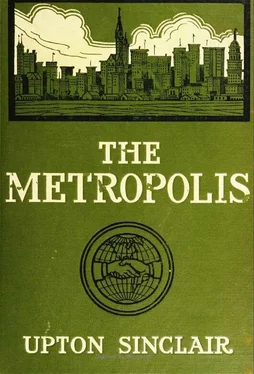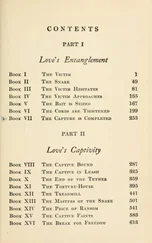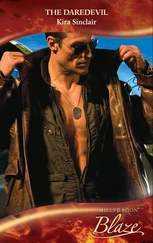Upton Sinclair - The Metropolis
Здесь есть возможность читать онлайн «Upton Sinclair - The Metropolis» весь текст электронной книги совершенно бесплатно (целиком полную версию без сокращений). В некоторых случаях можно слушать аудио, скачать через торрент в формате fb2 и присутствует краткое содержание. Год выпуска: 1908, Издательство: New York, Moffat, Yard & company, Жанр: Старинная литература, на английском языке. Описание произведения, (предисловие) а так же отзывы посетителей доступны на портале библиотеки ЛибКат.
- Название:The Metropolis
- Автор:
- Издательство:New York, Moffat, Yard & company
- Жанр:
- Год:1908
- ISBN:нет данных
- Рейтинг книги:5 / 5. Голосов: 1
-
Избранное:Добавить в избранное
- Отзывы:
-
Ваша оценка:
- 100
- 1
- 2
- 3
- 4
- 5
The Metropolis: краткое содержание, описание и аннотация
Предлагаем к чтению аннотацию, описание, краткое содержание или предисловие (зависит от того, что написал сам автор книги «The Metropolis»). Если вы не нашли необходимую информацию о книге — напишите в комментариях, мы постараемся отыскать её.
The Metropolis — читать онлайн бесплатно полную книгу (весь текст) целиком
Ниже представлен текст книги, разбитый по страницам. Система сохранения места последней прочитанной страницы, позволяет с удобством читать онлайн бесплатно книгу «The Metropolis», без необходимости каждый раз заново искать на чём Вы остановились. Поставьте закладку, и сможете в любой момент перейти на страницу, на которой закончили чтение.
Интервал:
Закладка:
Digitized by Microsoft®
had collected all the literature of the corps which he had commanded — a whole library of it, in which Allan had learned to find his way as soon as he could read. He had literally been brought up on the war — for hours he would lie buried in some big illustrated history, until people came and called nim away. He studied maps of campaigns and battle-fields, until they became alive with human passion and struggle; he knew the Army of the Potomac by brigade and division, with the names of commanders, and their faces, and their ways — until they lived and spoke, and the bare roll of their names had power to thrill him. — And now here were the men themselves, and all these scenes and memories crowding upon him in tumultuous throngs. No wonder that he was a little dazed, and could hardly find words to answer when he was spoken to.
But then came an incident which called him suddenly back to the world of the present. "There is Judge Ellis," said the General.
Judge Ellis! The fame of his wit and eloquence had reached even far Mississippi — was there any remotest corner of America where men had not heard of the silver tongue of Judge Ellis.? "Cultivate him!" Montague's brother Oliver had laughed, when it was mentioned that the Judge would be present — " Cultivate him — he may be useful."
It was not difficult to cultivate one who was as gracious as Judge Ellis. He stood in the doorway, a smooth, perfectly groomed gentleman, conspicuous in the uniformed assembly by his evening dress. The Judge was stout and jovial.
Digitized by Microsoft®
and cultivated Dundreary whiskers and a beaming smile. "General Montague's son!" he exclaimed, as he pressed the young man's hands. " Why, why — I m surprised ! Why have we never seen you before.'''
Montague explained that he had only been in New Yom about six hours. "Oh, I see," said the Judge. "And shall you remain long.?"
" I have come to stay," was the reply.
"Well, well!" said the other, cordially. "Then we may see more of you. Are you going into business.?"
"I am a lawyer," said Montague. "I expect to practise."
The Judge's quick glance had been taking the measure of the tall, handsome man before him, 'with his raven-black hair and grave features. "You must give us a chance to try your mettle," he said; and then, as others approached to meet him, and he was forced to pass on, he laid a caressing hand on Montague's arm, whispering, with a sly smile, "I mean it."
Montague felt his heart beat a little faster. He had not welcomed his brother's suggestion — there was nothing of the sycophant in him; but he meant to work and to succeed, and he knew what the favour of a man like Judge Ellis would mean to him. For the Judge was the idol of New York's business and political aristocracy, and the doorways of fortune yielded at his touch.
There were rows of chairs in one of the rooms, and here two or three hundred men were gathered. There were stands of battle-flags in the corners, each one of them a scroll of tragic his-
Digitized by Microsoft®
tory, to one like Montague, who understood. His eye roamed over them while the secretary was reading minutes of meetings and other routine announcements. Then he began to study the assemblage. There were men with one arm and men with one leg — one tottering old soldier ninety years of age, stone blind, and led about by his friends. The Loyal Legion was an officers' organisation, and to that extent aristocratic; but worldly success counted for nothing in it — some of its members were struggling to exist on their pensions, and were as much thought of as a man like General Prentice, who was president of one of the city's largest banks, and a rich man, even in New York's understanding of that term.
The presiding officer introduced " Colonel Robert Selden, who will read the paper of the evening: 'Recollections of Spottsylvania.'" Montague started at the name — for "Bob" Selden had been one of his father's messmates, and had fought all through the Peninsula Campaign at his side.
He was a tall, hawk-faced man with a grey imperial. The room was still as he arose, and after adjusting his glasses, he begari to read his story. He recalled the situation of the Army of the Potomac in the spring of 1864; for three years it had marched and fought, stumbling through defeat after defeat, a mighty weapon, lacking only a man who could wield it. Now at last the man had come — one who would put them into the battle and give them a chance to fight. So they had marched into the Wilderness,
Digitized by Microsoft®
and there Lee struck them, and for three days they groped in a bUnd thicket, fighting hand to hand, amid suffocating smoke. The Colonel read in a quiet, unassuming voice; but one could see that he had hold of his hearers by the light that crossed their features when he told of the army's recoil from the shock, and of the wild joy that ran through the ranks when they took up their march to the left, and realised that this time they were not going back. — So they came to the twelve days' grapple of the Spottsylvania Campaign.
There was still the Wilderness thicket; the enemy's intrenchments, covering about eight miles, lay in the shape of a dome, and at the cupola of it were breastworks of heavy timbers banked with earth, and with a ditch and a tangle of trees in front. The place was the keystone of the Confederate arch, and the name of it was "the Angle"—"Bloody Angle!" Montague heard the man who sat next to him draw in nis breath, as if a spasm of pain had shot through him.
At dawn two brigades had charged and captured the place. The enemy returned to the attack, and for twenty hours thereafter the two armies fought, hurling regiment after regiment and brigade after brigade into the trenches. There was a pouring rain, and the smoke hung black about them; they could only see the flashes of the guns, and the faces of the enemy, here and there.
The Colonel described the approach of his regiment. They lay down for a moment in a swamp, and the minie-balls sang like swarming
Digitized by Microsoft®
bees, and split the blades of the grass above them. Then they charged, over ground that ran with human blood. In the trenches the bodies of dead and dying men lay three deep, and were trampled out of sight in the mud by the feet of those who fought. They would crouch behind the works, lifting their guns high over their heads, and firing into the throngs on the other side; again and again men sprang upon the breastworks and fired their muskets, and then fell dead. They dragged up cannon, one after another, and blew holes through the logs, and raked the ground with charges of canister.
While the Colonel read, still in his calm, matter-of-fact voice, you might see men leaning forward in their chairs, hands clenched, teeth set. They knew ! They knew ! Had there ever before been a time in history when breastworks had been charged by artillery? Twenty-four men in the crew of one gun, and only two unhurt! One iron sponge-bucket with thirty-nine bullet holes shot through it! And then blasts of canister sweeping the trenches, and blowing scores of living and dead men to fragments! And into this hell of slaughter new regiments charging, in lines four deep! And squad after squad of the enemy striving to surrender, and shot to pieces by their own comrades as they clambered over the blood-soaked walls! And heavy timbers in the defences shot to splinters! Huge oak trees — one of them twenty-four inches in diameter — crashing down upon the combatants, gnawed through by rifle-bullets ! Since the world began had men ever fought like that .J*
Digitized by Microsoft®
Then the Colonel told of his own wound in the shoulder, and how, toward dusk, he had crawled away; and how he became lost, and strayed into the enemy's line, and was thrust into a batch of prisoners and marched to the rear. And then of the night that he spent beside a hospital camp in the wilderness, where hundreds of wounded and dying men lay about on the rain-soaked ground, moaning, screaming, praying to be killed. Again the prisoners were moved, naving been ordered to march to the railroad; and on the way the Colonel went blind from suffering and exhaustion, and staggered and fell in the road. You could have heard a pin drop in the room, in the pause between sentences in his story, as he told how the guard argued with him to persuade him to go on. It was their duty to kiU him if he refused, but they could not bring themselves to do it. In the end they left the job to one, and he stood and cursed the officer, trying to get up his courage; and finally fired his gun into the air, and went off and left him.
Читать дальшеИнтервал:
Закладка:
Похожие книги на «The Metropolis»
Представляем Вашему вниманию похожие книги на «The Metropolis» списком для выбора. Мы отобрали схожую по названию и смыслу литературу в надежде предоставить читателям больше вариантов отыскать новые, интересные, ещё непрочитанные произведения.
Обсуждение, отзывы о книге «The Metropolis» и просто собственные мнения читателей. Оставьте ваши комментарии, напишите, что Вы думаете о произведении, его смысле или главных героях. Укажите что конкретно понравилось, а что нет, и почему Вы так считаете.












